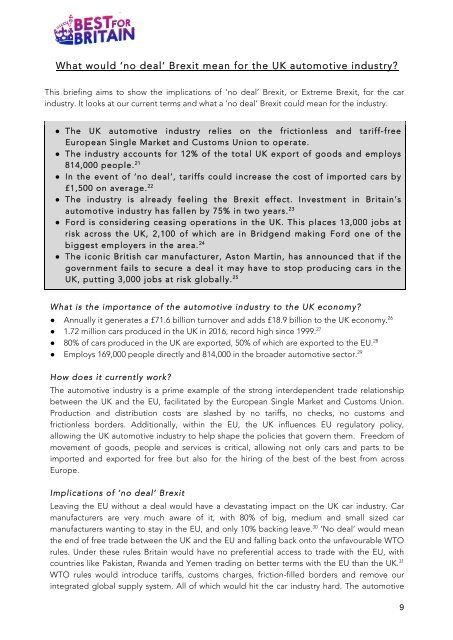Best for Britain Brexit-Reports-6.12.17-FINAL
Create successful ePaper yourself
Turn your PDF publications into a flip-book with our unique Google optimized e-Paper software.
What would ‘no deal’ <strong>Brexit</strong> mean <strong>for</strong> the UK automotive industry?<br />
This briefing aims to show the implications of ‘no deal’ <strong>Brexit</strong>, or Extreme <strong>Brexit</strong>, <strong>for</strong> the car<br />
industry. It looks at our current terms and what a ‘no deal’ <strong>Brexit</strong> could mean <strong>for</strong> the industry.<br />
● The UK automotive industry relies on the frictionless and tariff-free<br />
European Single Market and Customs Union to operate.<br />
● The industry accounts <strong>for</strong> 12% of the total UK export of goods and employs<br />
814,000 people. 21<br />
● In the event of ‘no deal’, tariffs could increase the cost of imported cars by<br />
£1,500 on average. 22<br />
● The industry is already feeling the <strong>Brexit</strong> effect. Investment in <strong>Britain</strong>’s<br />
automotive industry has fallen by 75% in two years. 23<br />
● Ford is considering ceasing operations in the UK. This places 13,000 jobs at<br />
risk across the UK, 2,100 of which are in Bridgend making Ford one of the<br />
biggest employers in the area. 24<br />
● The iconic British car manufacturer, Aston Martin, has announced that if the<br />
government fails to secure a deal it may have to stop producing cars in the<br />
UK, putting 3,000 jobs at risk globally. 25<br />
What is the importance of the automotive industry to the UK economy?<br />
● Annually it generates a £71.6 billion turnover and adds £18.9 billion to the UK economy. 26<br />
● 1.72 million cars produced in the UK in 2016, record high since 1999. 27<br />
● 80% of cars produced in the UK are exported, 50% of which are exported to the EU. 28<br />
● Employs 169,000 people directly and 814,000 in the broader automotive sector. 29<br />
How does it currently work?<br />
The automotive industry is a prime example of the strong interdependent trade relationship<br />
between the UK and the EU, facilitated by the European Single Market and Customs Union.<br />
Production and distribution costs are slashed by no tariffs, no checks, no customs and<br />
frictionless borders. Additionally, within the EU, the UK influences EU regulatory policy,<br />
allowing the UK automotive industry to help shape the policies that govern them. Freedom of<br />
movement of goods, people and services is critical, allowing not only cars and parts to be<br />
imported and exported <strong>for</strong> free but also <strong>for</strong> the hiring of the best of the best from across<br />
Europe.<br />
Implications of ‘no deal’ <strong>Brexit</strong><br />
Leaving the EU without a deal would have a devastating impact on the UK car industry. Car<br />
manufacturers are very much aware of it, with 80% of big, medium and small sized car<br />
manufacturers wanting to stay in the EU, and only 10% backing leave. 30 ‘No deal’ would mean<br />
the end of free trade between the UK and the EU and falling back onto the unfavourable WTO<br />
rules. Under these rules <strong>Britain</strong> would have no preferential access to trade with the EU, with<br />
countries like Pakistan, Rwanda and Yemen trading on better terms with the EU than the UK. 31<br />
WTO rules would introduce tariffs, customs charges, friction-filled borders and remove our<br />
integrated global supply system. All of which would hit the car industry hard. The automotive<br />
9
















